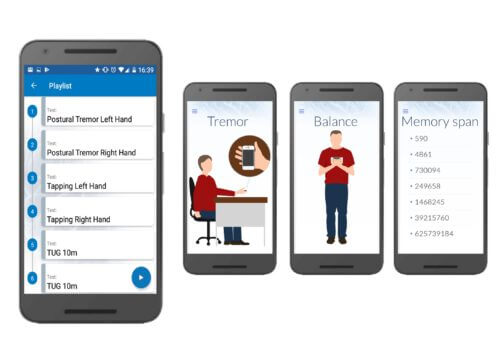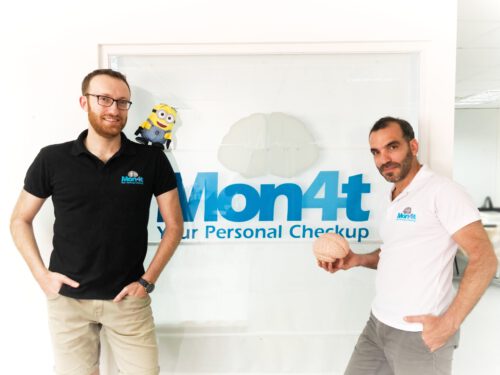This is what Ziv Yekothiali, founder and CEO of Monfort, an Israeli start-up company that has turned the smartphone into a device for monitoring neurological diseases, says in an interview with the Hidan website.

The Israeli start-up company Brain Monitor Montfort (Mon4T), which specializes in neurological diseases, is launching a solution it developed for remote brain monitoring, in real time. Monfort's solution, approved by the FDA, uses smartphone technology and artificial intelligence (AI) to conduct neurological tests for patients with diseases such as Parkinson's, Huntington's, psychiatric diseases (such as schizophrenia) and more. In addition, the solution is also used for medical monitoring of those recovering from corona. These patients may suffer from symptoms similar to neurological diseases.
In recent months, Montfort has experienced increased demand worldwide for the EncephaLog solution it developed. The company carries out projects and collaborations with a number of hospitals, companies in the medical field and research institutes, including the Henry Ford Health System chain of medical centers in the USA, the American Medtronic company, Queen Mary Hospital in Hong Kong, the Bio Medico campus in Rome, Italy, and more.
On March 9, 2020, the Italian government imposed a national lockdown due to the outbreak of the Corona virus. These restrictions are also intended to protect people with chronic diseases, a population at risk from the complications of the corona virus. However, many of these patients needed close supervision and a treatment routine that needed to be changed and adjusted from time to time. Monfort's application provided remote monitoring of Parkinson's patients in Italy, in terms of motor and cognitive functions.
"Nearly a billion people around the world suffer from various neurological and psychiatric diseases. The diagnosis and treatment require a physical meeting between the doctor and the patient, based on short and infrequent visits to the clinic. As a result, the quality of patient care is limited and the cost increases - about 800 billion dollars in the US alone," notes Dr. Yekuthiali in an interview with the website Hidan.
How did you come up with the idea?
I came up with the idea by chance, for many years I have been involved in the field between electronics and neurophysiology or neurology. I had an idea for a chip that would be implanted in people and that would record their activities. Prof. Hagai Bergman from Hadassah, one of the doctors I spoke with said, 'Leave you from new chips, we no longer know how to utilize all the existing technologies and medicines.' Then the idea came to my mind to use a smartphone for a specific product that would test the intensity of tremors in Parkinson's patients. From this Montfort was founded. We realized that it is possible to provide the doctor with indicators about the patient from the same tests as the offensive ones he does. From there we expanded the toolbox to a lot of tests that today have to be done to go to the clinic, they take a lot of time and do not give a quantitative measurement and those that do give a quantitative measurement are done in very expensive labs that are difficult to reach. It turned out to us that the sensors inside the device are sensitive enough if used correctly to give the same indicators that the doctor needs."

What is the importance of the product?
We faced a challenge. The world of neurology is between fifty and a hundred years behind the rest of the medical world. If we take the example of diabetes, there is a very simple tool to quantitatively and accurately measure the sugar level. In neurology, even in the clinic, the doctor does not have the ability to quantitatively measure tremor intensity. If the modern sensors for diabetes started in the hospitals, moved to the health insurance funds and then to the smart phone of the patients, now the same move is also being made in neurology. The patient performs tests at home, the data is uploaded to the cloud, you can compare patients, give an alert if something goes wrong."
The challenge was to show that with the help of a commercial device found in every pocket it is possible to measure not only movement symptoms such as tremors, gait and more in general, but it is also possible to reach a level that would allow the use of the phone as a medical device. Many of our tests are FDA approved.
The Montfort app comes in two versions: a clinical app, for use by the doctor in the clinic, and a home version that patients can use in their natural environment. The indicators provide accurate tests in three dimensions: motor (balance, gait, tremor, etc.), cognitive (memory, reaction time, etc.), and emotional (based on patterns of movement and social interaction). All of these merge into a fourth dimension of physiological records such as genetics, brain scans and other measurement scales provided by the doctor, alongside data that comes from wearable medical devices. The information collected from all patients and analyzed using Monfort's algorithms and AI helps in the management of clinical studies, faster diagnosis of patients and more effective ongoing treatment.
Monfort was founded by the CEO Dr. Ziv Yekothiali, an electronics engineer and neuroscientist with 20 years of experience linking the two disciplines, and Dima Gershman, CTO, a senior information systems engineer. Among the members of Montfort's advisory board is Prof. Peter Levitt, professor of neurology at Wayne State School of Medicine in the USA, and head of the motion sickness and Parkinson's program at Henry Ford Hospital in Michigan, USA. Prof. Hagai Bergman, senior neuroscientist at the Faculty of Medicine at the Center for Brain Research at the Hebrew University, and at the Hadassah Medical Center. Prof. Paul Friedman, Professor of Clinical Neuro-Immunology at Charité Hospital and Medical School Berlin, Germany.
In Israel about two years ago, Montfort received funding for research and clinical development of its technology at the Henry Ford headquarters in Detroit, Michigan. In addition, in the last six months, Monfort has been supplying the Brazilian hospital Clinical Hospital of Porto Alegre A platform for remote patient monitoring in order to monitor motor and cognitive symptoms in hundreds of medical staff employees who have recovered from Corona.
